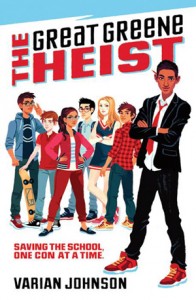It was my pleasure to interview The Pirate Tree reviewer Varian Johnson about his new book The Great Green Heist. One of the misconceptions that people have about The Pirate Tree is that we write reviews of “issue” books but, in fact, we like to write reviews of books that deal in various ways with the human condition. These books may be humorous, psychological, serious, realistic or fantasy. They may come to use via genres like romance or mystery or thriller or sci fi. But all of them consider the layers and complexities of being human. Varian’s new middle-grade novel, The Great Greene Heist, is a humorous look at political corruption, elections, and the problems of middle school.
I noticed several compelling themes that run lightly throughout The Great Greene Heist–themes of honesty, electioneering, political corruption, not to mention corruption of authority figures, and also the corruption influence of money. Can you talk about why those issues are critical–and especially critical now, in 2014–and how they seemed like organic ones to explore within this particular story?
Johnson: When I first started the novel, the heist was geared around a homecoming election. That quickly changed when I realized a student council election would carry more weight—at least in the world I created.
Every time we turn on the news, we hear about some type of voter fraud or bribery or corruption in politics, and I wanted to explore that—lightly—in this novel. I think many of us feel helpless when something happens in an election that doesn’t look quite “right”, and I wanted to give my characters a chance to fight back. However, I also wanted to convey the importance of following the correct election procedures (and actually voting), so while Jackson’s crew pulls a lot of tricks and cons, they still remember to vote and campaign for the candidate of their choice.
You have a diverse cast of characters but this is certainly not a book that clobbers people over the head, screaming, “This is a book with characters of multi-ethnic backgrounds and socioeconomic status.” It is refreshing to read books where race is not the issue, even though the kids are from such diverse backgrounds. First, I’d love to hear you talk about the importance of having books like this in libraries, classrooms, and bookstores. Second, can you name one or two other books that fall into this category that are personal favorites of yours?
Johnson: Diversity is so important, but it’s not enough to see diverse characters in books—we need to see diverse characters in diverse situations. I don’t know how many times I’ve heard something along the lines of “all the books about black kids are about slavery or the civil rights movement.” While that’s not exactly true, it can certainly seem that way to a young reader. When I was a younger, I wanted to see myself reflected in the world I knew—a world that was sometimes scary, but a world also influenced by the normalcy of suburbia. I wanted to see myself in mysteries, thrillers, love stories and science fiction—basically, I wanted to see myself in everything.
Although we have a long way to go, our industry has become much more open to seeing people of color in books that aren’t just about a main character’s ethnicity. A few YA novels that fit into this category include The Living by Matt de la Pena, Marcelo in the Real World, by Francisco X. Stork, and If You Come Softly by Jacqueline Woodson.
Having said this, of course, the book does make a nod to the kind of unthinking racism that many kids encounter, with an administrative assistant who can’t tell kids apart as individuals, who can’t tell one Mexican kid apart from another. On the one hand, this serves as a really great plot device within the story, since the kids are then able to fool her in necessary ways; but on the other hand, you must have consciously and deliberately chosen to include this. Can you talk about making this choice within a book that is otherwise free of the common discussions of race in books with kids of various ethnic backgrounds?
Johnson: Oh, I totally wanted to include that subplot, and not just because it worked for some of the capers. There are certain things that people of color often experience that others don’t. And even though the book isn’t about racism, it still exists, and I wanted to find a way to touch on in. While some readers will gloss over those scenes, I hope they will spur further thought and discussion in other readers.
Are you working on a sequel?
Johnson: I’m working on a sequel that takes place about four months after The Great Greene Heist. All of Gang Greene returns, along with a few new faces. The current plan is for it to be published in the fall of 2015, but as with all things in publishing, a book is never certain until it’s actually on the shelves.
